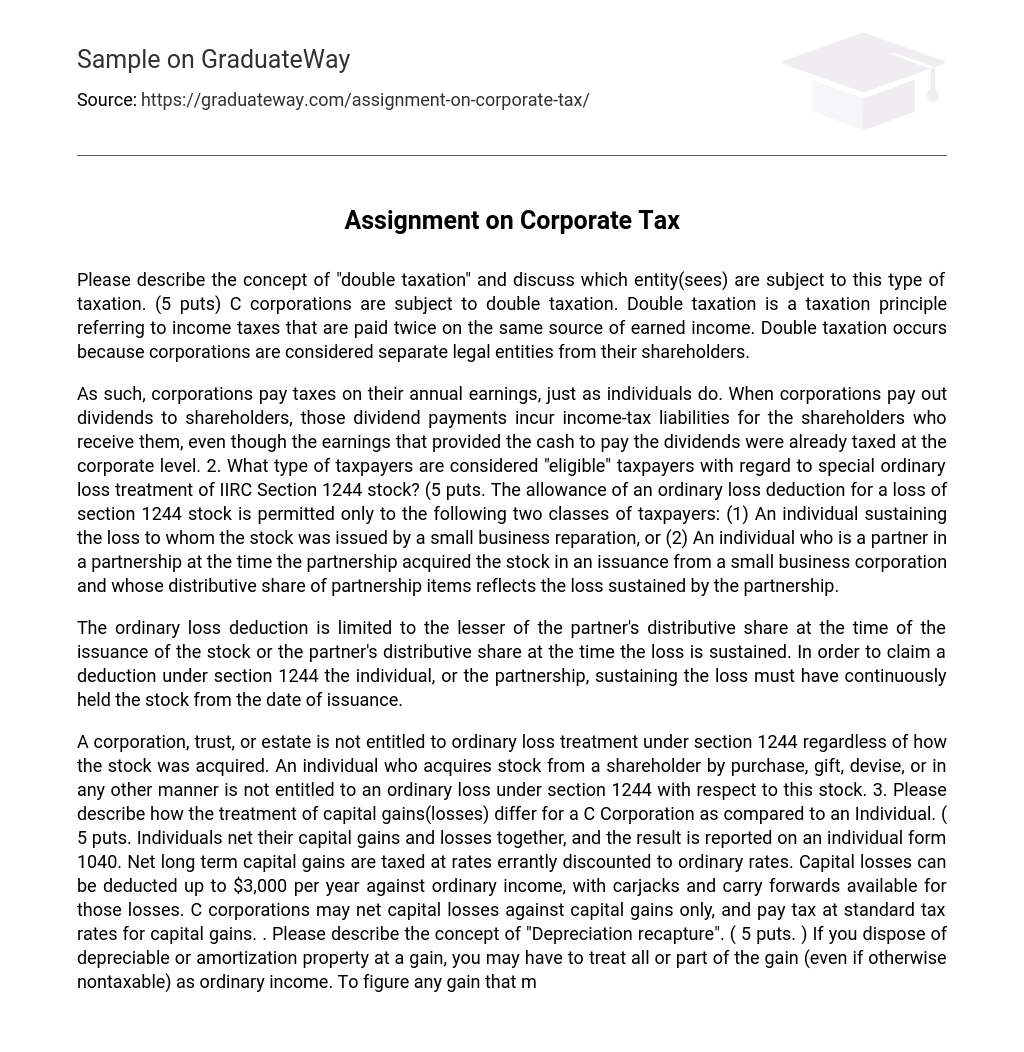Please describe the concept of “double taxation” and discuss which entity(sees) are subject to this type of taxation. (5 puts) C corporations are subject to double taxation. Double taxation is a taxation principle referring to income taxes that are paid twice on the same source of earned income. Double taxation occurs because corporations are considered separate legal entities from their shareholders.
As such, corporations pay taxes on their annual earnings, just as individuals do. When corporations pay out dividends to shareholders, those dividend payments incur income-tax liabilities for the shareholders who receive them, even though the earnings that provided the cash to pay the dividends were already taxed at the corporate level. 2. What type of taxpayers are considered “eligible” taxpayers with regard to special ordinary loss treatment of IIRC Section 1244 stock? (5 puts. The allowance of an ordinary loss deduction for a loss of section 1244 stock is permitted only to the following two classes of taxpayers: (1) An individual sustaining the loss to whom the stock was issued by a small business reparation, or (2) An individual who is a partner in a partnership at the time the partnership acquired the stock in an issuance from a small business corporation and whose distributive share of partnership items reflects the loss sustained by the partnership.
The ordinary loss deduction is limited to the lesser of the partner’s distributive share at the time of the issuance of the stock or the partner’s distributive share at the time the loss is sustained. In order to claim a deduction under section 1244 the individual, or the partnership, sustaining the loss must have continuously held the stock from the date of issuance.
A corporation, trust, or estate is not entitled to ordinary loss treatment under section 1244 regardless of how the stock was acquired. An individual who acquires stock from a shareholder by purchase, gift, devise, or in any other manner is not entitled to an ordinary loss under section 1244 with respect to this stock. 3. Please describe how the treatment of capital gains(losses) differ for a C Corporation as compared to an Individual. ( 5 puts. Individuals net their capital gains and losses together, and the result is reported on an individual form 1040. Net long term capital gains are taxed at rates errantly discounted to ordinary rates. Capital losses can be deducted up to $3,000 per year against ordinary income, with carjacks and carry forwards available for those losses. C corporations may net capital losses against capital gains only, and pay tax at standard tax rates for capital gains. . Please describe the concept of “Depreciation recapture”. ( 5 puts. ) If you dispose of depreciable or amortization property at a gain, you may have to treat all or part of the gain (even if otherwise nontaxable) as ordinary income. To figure any gain that must be reported as ordinary income, you must pep permanent records of the facts necessary to figure the depreciation or amortization allowed or allowable on your property.
This includes the date and manner of acquisition, cost or other basis, depreciation or amortization, and all other adjustments that affect basis. On property you acquired in a nontaxable exchange or as a gift, your records also must indicate the following information: Whether the adjusted basis was figured using depreciation or amortization you claimed on other property. Whether the adjusted basis was figured using depreciation or amortization another person claimed.





